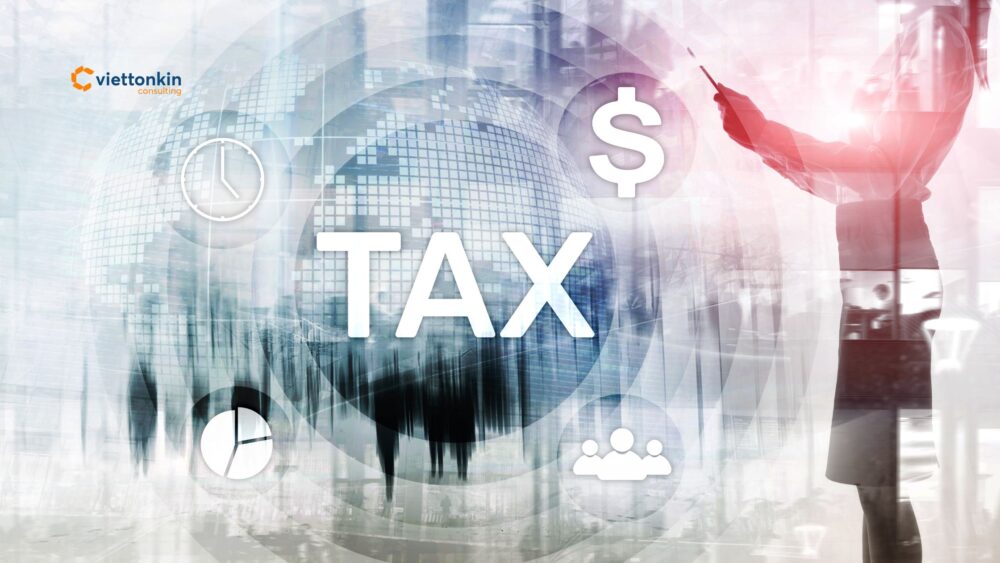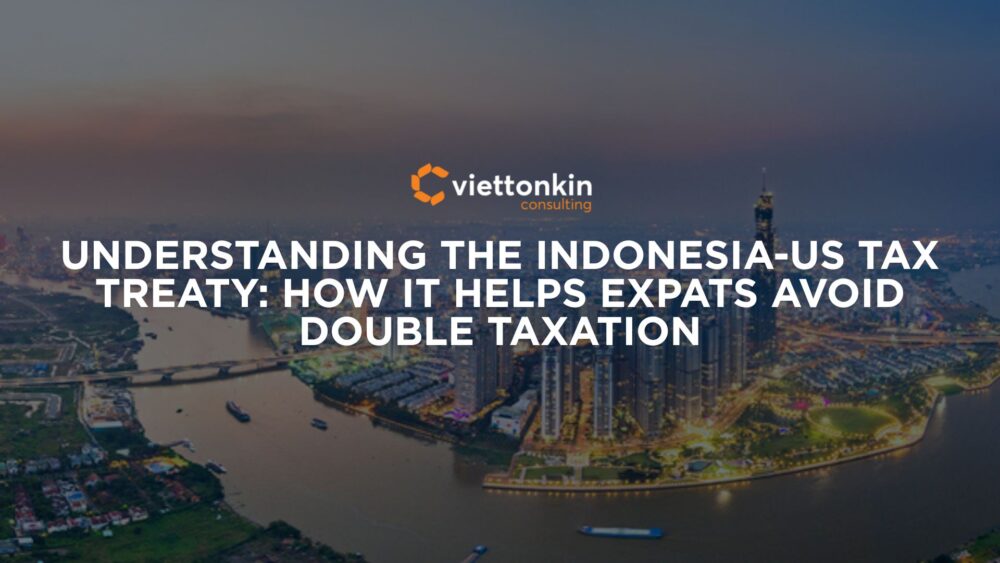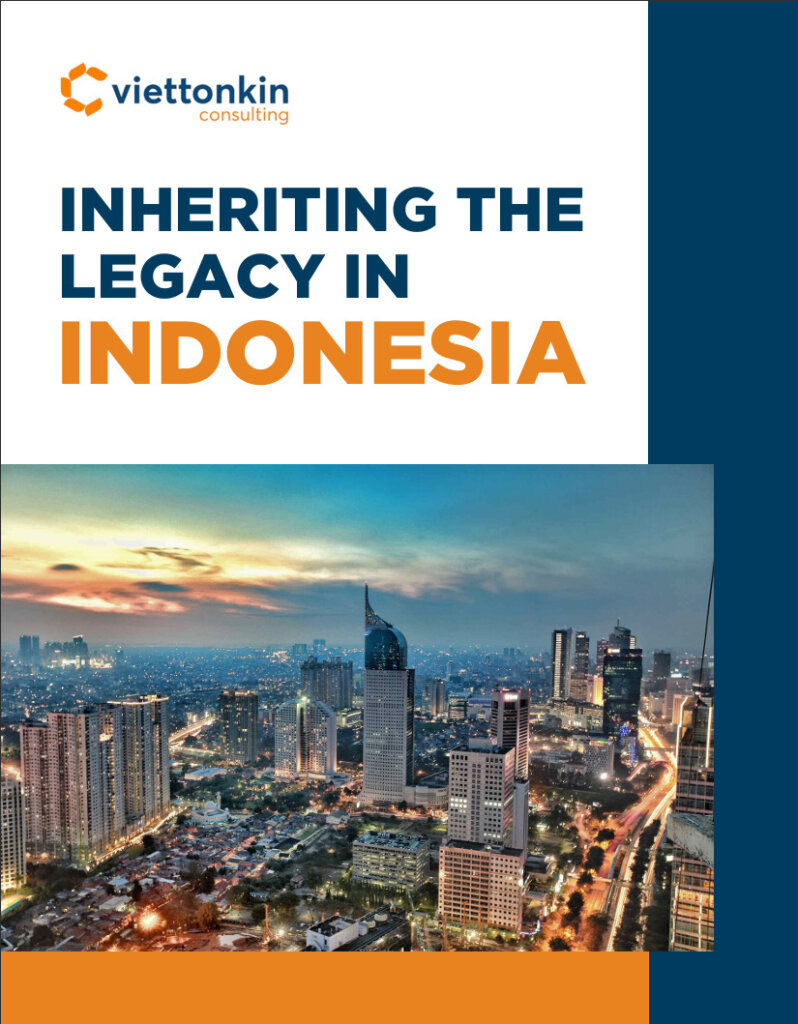Establishing kindergarten in Vietnam has become a compelling venture for foreign investors, driven by a boom in the nation's preschool education sector. With over five million children enrolled and approximately 15,275 preschool facilities, including about 3,163 private schools attending private kindergarten institutions (20%) during the period 2023-2024, the demand is clear. However, navigating the country’s […]
The call came in from a long-term client expanding into Indonesia—they were worried that their US executives operating there would be hit with double taxation, putting their entire expansion budget at risk. From my 6+ years managing client relationships at Viettonkin, I’ve seen how quickly cross-border financial complexities, especially those involving cross-border business activities, can derail a promising investment. My experience navigating the intricate FDI laws in Vietnam has taught me that proactive, clear strategies are the only way to protect our clients’ interests, whether in Hanoi or Jakarta. The US-Indonesia Tax Treaty is a critical tool for this, particularly for international business, but its real value lies in understanding how to use it correctly.
Many American investors and their teams operating abroad don’t realize they can get significant tax relief, or they misapply the rules and face penalties. What I’ve learned from ensuring our clients never face legal surprises is that a tax treaty isn’t just a document; it’s a framework for security. The US-Indonesia Tax Treaty represents an agreement between the two countries to resolve double taxation issues and facilitate business and investment across borders. The goal is to turn tax challenges into a strategic advantage, and this guide will show you how.
Key Takeaways:
- Prevents Double Taxation: The primary function of the US-Indonesia tax treaty is to prevent you from paying taxes on the same income in both countries, mainly through the Foreign Tax Credit.
- Reduces Withholding Taxes: The treaty lowers the tax rates Indonesia can withhold on payments like dividends, interest, and royalties sent to a US resident.
- The “Savings Clause” is a Critical Limitation: This clause allows the US to tax its citizens on their worldwide income as if the treaty didn’t exist, but it provides mechanisms like tax credits to offset what you’ve paid to Indonesia.
- Benefits Are Not Automatic: You must actively claim treaty benefits on your US tax return with specific IRS forms. Failing to do so can lead to overpaying taxes.
- Strategic Choice is Required: You must generally choose between claiming the Foreign Tax Credit (FTC) or the Foreign Earned Income Exclusion (FEIE) to lower your US tax liability, a decision with significant financial consequences.
In addition to tax treaty benefits, Indonesia offers a range of opportunities and incentives for expats and foreign investors, such as tax allowances, visa options, and a favorable business environment. These advantages make Indonesia an attractive destination for international business and investment.

What is the Indonesia–US Tax Treaty and Why It Exists
The formal “Convention Between the Government of the Republic of Indonesia and the Government of the United States of America for the Avoidance of Double Taxation” is more than just government text; it’s a foundational element for economic partnership. According to the Organisation for Economic Co-operation and Development (OECD, 2017), the primary purpose of such model conventions is to eliminate double taxation and prevent fiscal evasion, which helps promote cross-border trade and investment.
Income tax treaties, such as this one, play a crucial role in international taxation by providing clear rules and benefits for taxpayers in both countries. The Indonesia–US Tax Treaty, which was signed in 1988 and became effective in 1990 under Government Regulation No. 42/1989, establishes maximum withholding rates on cross-border payments. Under the agreement, the rate for dividends is capped at 15%, which is reduced to 10% if the US shareholder owns at least 25% of the Indonesian paying company. For both interest and royalties, the treaty sets a maximum withholding rate of 10%, although there are exemptions for interest derived from certain types of government-related financing.
For an American individual or company, the income tax treaty, which is available on the U.S. Department of the Treasury’s website, provides several major advantages:
- Tax Credits: It allows you to claim a credit on your US tax return for income taxes paid to the Indonesian government.
- Reduced Withholding: The income tax treaty sets specific tax treaty rates, limiting the withholding tax Indonesia can apply on dividends (15%), interest (10%), and royalties (10%) paid to a US resident. These reduced tax treaty rates benefit taxpayers by lowering the overall tax burden on cross-border income.
- Dispute Resolution: It creates a formal process for the tax authorities of both countries to resolve conflicts if you are taxed improperly.
From my experience managing successful project deliveries across Vietnam, a clear, predictable tax framework is essential for investor confidence. This treaty provides that framework for taxpayers investing in Indonesia.
How Residency Status Affects Your Tax Obligations
Your tax obligations in Indonesia hinge on your residency status. Under Indonesian law, an individual is a tax resident if they are present in Indonesia for more than 183 days in a 12-month period or if they hold a residence permit indicating intent to reside in Indonesia. Indonesian citizens are generally classified as resident taxpayers if they meet these criteria, while those who do not are considered non-residents. Resident taxpayers are taxed on their worldwide income. Non-resident taxpayers are subject to a 20% final withholding tax on gross Indonesian-sourced income, unless a tax treaty provides for a reduced rate.
This is where most businesses run into trouble without proper guidance. Misinterpreting residency rules can lead to significant and unexpected tax liabilities. For US expats, the treaty includes “tie-breaker” rules to determine residency for tax purposes if both countries claim you as a resident, ensuring you are not unfairly taxed by both. These tie-breaker rules consider where you have a permanent home, the center of your vital interests, and, if those are inconclusive, your habitual abode, to resolve dual residency issues.
What Income Is Covered—and How It’s Treated
The way the treaty protects you depends entirely on the type of income you earn. The treaty distinguishes between income earned from employment and income received from other sources, such as investments or business activities, with each category subject to specific rules and potential exemptions. Taxable income, whether from employment, business profits, or investments, is treated differently under the agreement.
The treaty specifically addresses the taxation of business profits, outlining how cross-border commercial activities are taxed and which country has taxing rights. Certain exemptions and exemptions from tax may apply to specific types of income, such as employment or investment income, depending on the conditions set out in the treaty. In some cases, taxes are calculated on the gross amount of income received, before any deductions are made.
Wages and Employment Income
As a general rule, your employment income is taxed where you perform the work. If you live and work in Indonesia, that income is taxed by Indonesia. The US also taxes its citizens' worldwide income, but the Foreign Tax Credit (FTC) is the primary tool to prevent being taxed twice on the same earnings.
Dividends, Interest, and Royalties
This is where investors see the most direct benefit. Without the treaty, Indonesia could withhold tax at a higher flat rate, which is typically applied uniformly to dividends, interest, and royalties. The treaty significantly reduces these rates, leaving more capital in your pocket. To apply reduced treaty withholding tax rates in Indonesia, US residents must provide the Indonesian payer with a valid Certificate of Domicile (Form 6166 issued by the IRS), along with Indonesia’s DGT-1 form, rather than Form W-8BEN.
The "Savings Clause": A Critical Limitation
Here is a detail where I've seen many clients get confused. Most US tax treaties include a "Savings Clause," which preserves the right of the United States to tax its citizens and residents on their worldwide income as if the treaty didn't exist.This means you cannot simply ignore your US tax filing obligations because you live in Indonesia.
The practical effect is that you must maintain dual compliance. You still have to file a US tax return (Form 1040) and report all your foreign income and financial assets. The treaty’s power comes from the mechanisms it validates within the US tax code, such as the FTC and the Foreign Earned Income Exclusion (FEIE), which allow you to offset the taxes you've already paid to Indonesia.
Indonesian Taxes and Capital Gains: What Expats Need to Know
Navigating Indonesian taxes and capital gains can be a challenge for Americans living in Indonesia, especially when factoring in the Indonesia-US tax treaty. Understanding your tax residency status is the first step: Indonesian tax residents are taxed on their worldwide income, while non-residents are only taxed on Indonesian-sourced income. This distinction is crucial, as it determines which income is subject to Indonesian taxes and which may be eligible for relief under the tax treaty.
Capital gains in Indonesia are subject to special final tax rules: 0.1% of gross transaction value for listed shares, 5% on gains from non-listed shares, and 2.5% on real property transfers. These do not follow the general progressive income tax rates. However, there are notable exceptions. For instance, capital gains from the sale of shares in a dividend-paying company may be taxed at a reduced rate, depending on the specifics of the transaction and the status of the dividend recipient. Expats should pay close attention to these rules, as the tax rate applied can significantly impact their overall tax liability.
The Indonesia-US tax treaty is designed to prevent double taxation on such income. By claiming the foreign tax credit on your US tax return, you can offset Indonesian income taxes paid against your US tax liability, ensuring you are not taxed twice on the same income. To claim benefits under the treaty, you must typically be a resident taxpayer of one country and, in some cases, have a permanent establishment in the other. The treaty also provides for reduced withholding tax rates on dividends, interest, and royalties, but these benefits are only available if the beneficial owner of the income is a resident of one of the treaty countries and the income is subject to tax in that country.
It’s also important to consider social security taxes. Indonesia requires employers and employees, including expatriates holding a work permit valid for six months or more, to participate in BPJS health and employment social security programs. However, because there is no totalization agreement between the US and Indonesia, Americans living in Indonesia may find themselves subject to social security taxes in both countries, increasing their overall tax burden.
Given the complexity of Indonesian taxes, capital gains rules, and the nuances of the Indonesia-US tax treaty, consulting with a tax professional is highly recommended. An expert can help you determine your residency status, claim benefits under the treaty, utilize the foreign tax credit, and ensure compliance with both Indonesian and US tax obligations. This proactive approach is essential for minimizing your tax liability and avoiding costly mistakes.
How to Claim Tax Treaty Benefits as a U.S. Expat
From my project management experience, the key to success is in the implementation. Claiming treaty benefits requires diligent paperwork.
- Form 1116, Foreign Tax Credit: This is the most common form used to claim a dollar-for-dollar credit for taxes paid to Indonesia.
- Form 2555, Foreign Earned Income Exclusion: This form is used to exclude a portion of your foreign-earned income from US taxation.
- Form 8833, Treaty-Based Return Position Disclosure: This is required if you are taking a specific position that the treaty overrules or modifies US tax law, which is less common for individuals just claiming standard credits.
To get reduced withholding rates in Indonesia, you must provide the payer with a valid Form W-8BEN. Always keep your Indonesian tax receipts as proof of payment to support your filings with the IRS.
A Real-World Example of Strategic Structuring
Working directly with CEOs and international investors has taught me that proactive structuring is key. For example, we had a client with an FDI ownership structure issue in Vietnam that threatened their planned majority stake. The solution became clear when we understood our client’s real concern: control and profit repatriation. By using an alternative ownership structure with nominee arrangements and management agreements, we protected their investment and achieved 85% effective control.
In similar cross-border investments in Indonesia, the involvement of a foreign company or foreign corporation—such as a branch or subsidiary—requires careful consideration of Indonesian tax rules. Non resident corporations are subject to specific regulations, including withholding taxes on income remitted abroad and different tax obligations compared to resident entities. This principle of understanding the core objective to find a structural solution applies directly to tax planning in Indonesia. A well-structured investment can maximize the benefits offered by the treaty’s reduced withholding rates.
Social Security for US Expats in Indonesia

According to the U.S. Social Security Administration (2025), the United States and Indonesia do not have a totalization agreement, meaning U.S. citizens working in Indonesia may have to pay social security taxes in both countries.. Without one, a US citizen working in Indonesia, especially if self-employed, may be liable for social security taxes in both countries. This is a significant planning challenge that requires careful financial management to mitigate.
The Power of Systematic Planning
This is where our client success experience really matters. Take our long-term manufacturing client who expanded from one facility in Vietnam to five across different provinces. The challenge was coordinating complex regulatory requirements, including tax and social security obligations, across multiple jurisdictions. Our solution was systematic regulatory planning and ongoing compliance monitoring. The impact was a 300% growth in their investment value over four years. This proactive, systematic approach is exactly what’s needed to manage complex issues like dual social security liability in Indonesia.
Frequently Asked Questions
What is the most common mistake US expats make with the Indonesia tax treaty?
From my experience handling hundreds of legal challenges for investment clients, the most common mistake is assuming the treaty benefits are automatic. You must affirmatively claim them on your US tax return using the correct forms, like Form 1116 for the Foreign Tax Credit. Forgetting this step means you could pay tax twice on the same income unnecessarily.
How do I choose between the Foreign Tax Credit (FTC) and the Foreign Earned Income Exclusion (FEIE)?
The choice depends on your income level and the amount of tax you pay in Indonesia. The FTC is often more beneficial for high-income earners paying substantial Indonesian taxes, as it provides a dollar-for-dollar credit. The FEIE might be better if you are in a lower tax bracket. The key is to model both scenarios, as choosing one can have long-term implications.
How do I prove my residency to get lower withholding tax rates in Indonesia?
To receive the treaty's reduced withholding tax rates on income like dividends or royalties, you must provide the Indonesian entity paying you with a completed IRS Form W-8BEN. This form certifies that you are a resident of the United States for tax purposes. This is where seamless task completion oversight is critical; failing to provide this form on time can result in higher, non-treaty tax rates being withheld.
You might also like: Indonesia Report 2025: Human Rights, Economy, and the Investor’s Landscape












